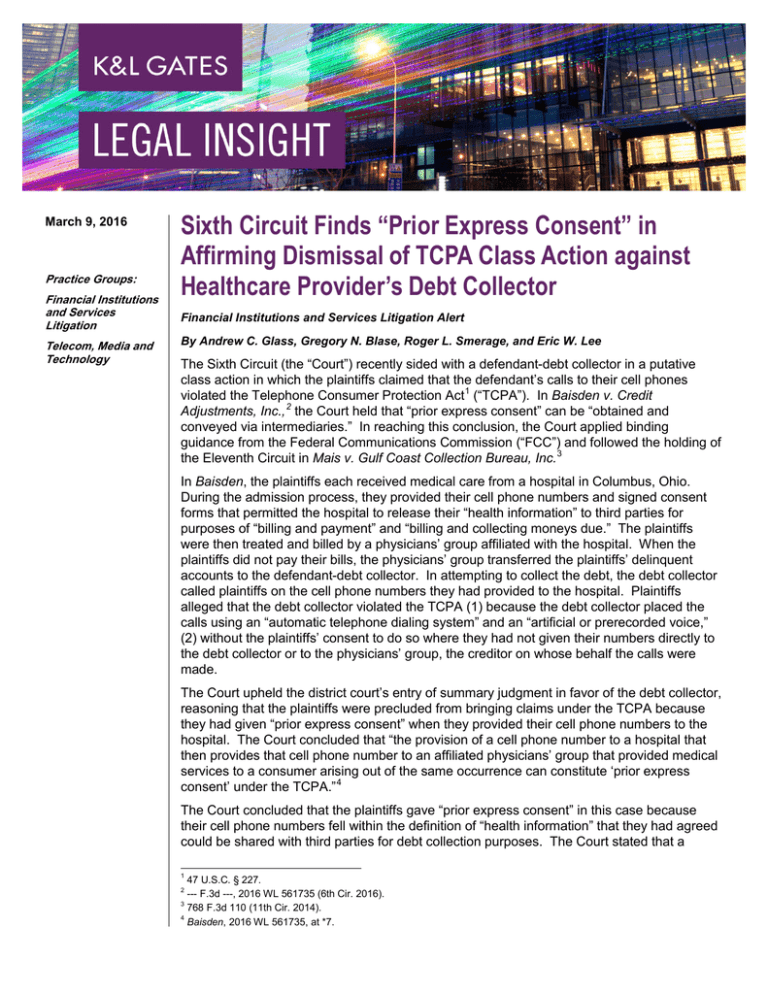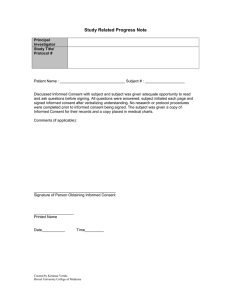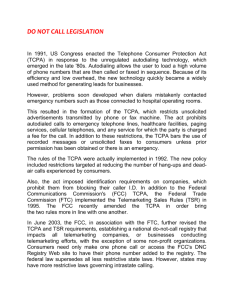
March 9, 2016
Practice Groups:
Financial Institutions
and Services
Litigation
Telecom, Media and
Technology
Sixth Circuit Finds “Prior Express Consent” in
Affirming Dismissal of TCPA Class Action against
Healthcare Provider’s Debt Collector
Financial Institutions and Services Litigation Alert
By Andrew C. Glass, Gregory N. Blase, Roger L. Smerage, and Eric W. Lee
The Sixth Circuit (the “Court”) recently sided with a defendant-debt collector in a putative
class action in which the plaintiffs claimed that the defendant’s calls to their cell phones
violated the Telephone Consumer Protection Act1 (“TCPA”). In Baisden v. Credit
Adjustments, Inc., 2 the Court held that “prior express consent” can be “obtained and
conveyed via intermediaries.” In reaching this conclusion, the Court applied binding
guidance from the Federal Communications Commission (“FCC”) and followed the holding of
the Eleventh Circuit in Mais v. Gulf Coast Collection Bureau, Inc. 3
In Baisden, the plaintiffs each received medical care from a hospital in Columbus, Ohio.
During the admission process, they provided their cell phone numbers and signed consent
forms that permitted the hospital to release their “health information” to third parties for
purposes of “billing and payment” and “billing and collecting moneys due.” The plaintiffs
were then treated and billed by a physicians’ group affiliated with the hospital. When the
plaintiffs did not pay their bills, the physicians’ group transferred the plaintiffs’ delinquent
accounts to the defendant-debt collector. In attempting to collect the debt, the debt collector
called plaintiffs on the cell phone numbers they had provided to the hospital. Plaintiffs
alleged that the debt collector violated the TCPA (1) because the debt collector placed the
calls using an “automatic telephone dialing system” and an “artificial or prerecorded voice,”
(2) without the plaintiffs’ consent to do so where they had not given their numbers directly to
the debt collector or to the physicians’ group, the creditor on whose behalf the calls were
made.
The Court upheld the district court’s entry of summary judgment in favor of the debt collector,
reasoning that the plaintiffs were precluded from bringing claims under the TCPA because
they had given “prior express consent” when they provided their cell phone numbers to the
hospital. The Court concluded that “the provision of a cell phone number to a hospital that
then provides that cell phone number to an affiliated physicians’ group that provided medical
services to a consumer arising out of the same occurrence can constitute ‘prior express
consent’ under the TCPA.” 4
The Court concluded that the plaintiffs gave “prior express consent” in this case because
their cell phone numbers fell within the definition of “health information” that they had agreed
could be shared with third parties for debt collection purposes. The Court stated that a
1
47 U.S.C. § 227.
--- F.3d ---, 2016 WL 561735 (6th Cir. 2016).
3
768 F.3d 110 (11th Cir. 2014).
4
Baisden, 2016 WL 561735, at *7.
2
Sixth Circuit Finds “Prior Express Consent” in Affirming Dismissal of TCPA
Class Action against Healthcare Provider’s Debt Collector
contrary finding “would be nonsensical” because it would render inoperative the consent form
provisions authorizing the disclosure of information as “necessary for ... purposes” of “billing
and collecting moneys due.” 5
The Court thus rejected the “narrow reading” advanced by plaintiffs, namely that a debt
collector only has prior express consent to call a consumer’s cell phone to collect a debt
where the consumer has provided the cell phone number to the creditor during the
application process. Instead, the Court held that “consumers may give ‘prior express
consent’ under the FCC’s interpretations of the TCPA when they provide a cell phone
number to one entity as part of a consumer transaction, which then provides the number to
another related entity from which the consumer incurs a debt that is part and parcel of the
reason they gave the number in the first place.”6
In supporting its conclusion, the Court looked to several sources, which bear noting:
• First, the Court looked to the FCC's 1992 interpretation of the TCPA, in which the FCC
ruled that "persons who knowingly release their phone numbers have in effect given their
invitation or permission to be called at the number which they have given.” 7 The Court's
reliance on this early order is significant, because it confirms that debt collectors may
avail themselves of the FCC's 1992 pronouncement regarding prior express and are not
limited to the later 2008 declaratory ruling.
• Second, the Court looked to the FCC's 2008 declaratory ruling where the FCC stated that
"the provision of a cell phone number to a creditor ... evidences prior express consent ...
to be contacted at that number" and further stated that calls placed by a debt collector are
"treated as if the creditor placed the call.”8 While the plaintiffs argued that the 2008
declaratory ruling only applies where the consumer provides a cell phone number at the
start of a credit relationship (i.e., on a loan application), the Court, relying on its earlier
precedent, rejected this and noted a consumer provides prior express consent by
providing a cell phone number at any point during a credit relationship. 9
• Finally, the Court looked to the FCC's GroupMe declaratory ruling and its reaffirmation of
that ruling in the FCC's July 2015 order, in which the FCC ruled that a caller may obtain
prior express consent through an intermediary.
In rejecting a narrow interpretation of “prior express consent,” the Court joins the Eleventh
Circuit in providing a path for debt collectors in the healthcare field to comply with the TCPA.
Thus, the Baisden decision appears to support a common-sense reading of the TCPA’s
consent provisions as they relate to debt collectors generally.
Authors:
Andrew C. Glass
andrew.glass@klgates.com
+1.617.261.3107
5
Id. at *9.
Id. at *7.
7
In re Rules and Regulations Implementing the TCPA, 7 FCC Rcd. 8752, 8769 (1992).
8
In re Rules and Regulations Implementing the TCPA, 23 FCC Rcd. 559, 564-65 (2008).
9
Hill v. Homeward Residential, Inc., 799 F.3d 544 (6th Cir. 2015).
6
2
Sixth Circuit Finds “Prior Express Consent” in Affirming Dismissal of TCPA
Class Action against Healthcare Provider’s Debt Collector
Gregory N. Blase
gregory.blase@klgates.com
+1.617.951.9059
Roger L. Smerage
roger.smerage@klgates.com
+1.617.951.9070
Eric W. Lee
eric.lee@klgates.com
+1.617.951.9240
Anchorage Austin Beijing Berlin Boston Brisbane Brussels Charleston Charlotte Chicago Dallas Doha Dubai Fort Worth Frankfurt
Harrisburg Hong Kong Houston London Los Angeles Melbourne Miami Milan Newark New York Orange County Palo Alto Paris Perth
Pittsburgh Portland Raleigh Research Triangle Park San Francisco São Paulo Seattle Seoul Shanghai Singapore Spokane
Sydney Taipei Tokyo Warsaw Washington, D.C. Wilmington
K&L Gates comprises more than 2,000 lawyers globally who practice in fully integrated offices located on five
continents. The firm represents leading multinational corporations, growth and middle-market companies, capital
markets participants and entrepreneurs in every major industry group as well as public sector entities, educational
institutions, philanthropic organizations and individuals. For more information about K&L Gates or its locations,
practices and registrations, visit www.klgates.com.
This publication is for informational purposes and does not contain or convey legal advice. The information herein should not be used or relied upon in
regard to any particular facts or circumstances without first consulting a lawyer.
© 2016 K&L Gates LLP. All Rights Reserved.
3




